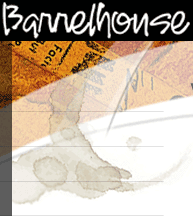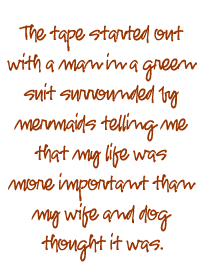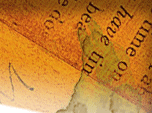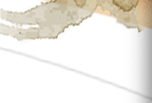 |
|
|
|
|
|
|
|
|
 |
 |
|
|

Tom WhalenWent to the little convenience store on the corner to buy a can of dog food for my dog, but bought instead a video cassette on what to do in case of death. Where's the dog food, my wife asked, but I showed her the tape, and she said, You're an idiot, but I told her it might be best to withhold her opinion until we had seen the tape, but she said again, You're an idiot, and so I went into our bedroom and shoved in the tape.  The tape started out with a man in a green suit surrounded by mermaids telling me that my life was more important than my wife and dog thought it was, and if I happened to die suddenly I'd have to fend for myself in the afterlife, so I'd best forget about help from those dear to me. The tape started out with a man in a green suit surrounded by mermaids telling me that my life was more important than my wife and dog thought it was, and if I happened to die suddenly I'd have to fend for myself in the afterlife, so I'd best forget about help from those dear to me.
Then James said (he said his name was James) that after he died he had had to learn the hard way what he was about to tell me, i.e., through experience, but that I could be saved from all the trouble he faced in the initial stages of crossing over (his terminology) because I had the good sense to buy this tape. I said I was lured by the title Surviving Death and by the seven mermaids on the cover, each in various stages of undress, and various stages of life—a baby, a young child, an adolescent, etc.—and he said (I'm not sure how he could hear me, but he could, or at least it seemed like he could) that the packaging was one thing and my inner needs another, and it was the latter that had attracted me to this tape. That sounded reasonable, if albeit mysterious, so I didn't say anything and let him continue. At first I didn't understand a thing he was saying, something about recycling the astral body, and about the skull bowl and seven bowings before the setting face to face, etc., etc., and he mentioned ibex, oarlocks, a lock of my first love's hair, but I said I didn't know where my first love was anymore, had lost track of her about twenty years ago, if not longer, and last I heard she'd like to see me behind bars (she was thirteen at the time I fell in love with her, I was fifteen), but he said we could forgo that part of the instructions. Then, I don't know why, but suddenly it struck me that he resembled another James, a famous one, the American writer Henry James. He was bald, portly, a bit porpoise-like, and stiff. So I said, Hey, you know, you resemble Henry James, the American writer. Yes, he said, that's who I am, or was. This surprised me. I hadn't read much James, only the one about the ghosts who were after the souls of a couple of kids and the one about the American girl who dies of some disease she contracts in the Roman Coliseum, but I knew enough about his life to know that, for one thing, he'd died long before VCRs or DVDs came onto the market. But I was truly intrigued, so I asked him if he had written anything since crossing over. No, he said, and didn't seem to want to pursue the matter. But I thought: James, books, money, and said, Hey, Mr. James, why don't you write something, dictate it to me and I could try to pass if off as a lost work. Wouldn't sell, he said, perfunctorily, and added, Much of my work is still unread or misread, any number of stories and novellas, and there are those last novels I couldn't complete, The Sense of the Past and The Ivory Tower. I'm no more marketable now than I was then. I could have told him about the movies adapted from his books, but I didn't think he wanted to hear it. Society life, in the afterlife, he continued, bears no resemblance to the blending of the personages in your life into the life of society. To which I said, What? and he replied, Just a sample of my continued unmarketability. But, I said, look at you now. A real item. I trot to the store to buy dog food and see this tape about how to cross from one state of being to another, then buy the tape without thinking about the dog food. You've got marketing skills you didn't dream of in this life. What kind of dog? Huh? What kind of dog? he asked again. Schnauzer, I said, my wife's dog. Yes, he said, in the afterlife dogs of that breed belong to the fourth realm where Anabaxis dwells within his eighteen houses of the moon. You must shed your past if you are to enter the afterlife realm. You must begin to breathe with the dust particles the essence of everness. You must make your way into this life by means of forgetting and forgoing if you are to pass into this world where you may become like a tape in a VCR that never needs its tracking mode adjusted. You must make way for the great ones who have slept these centuries for lack of anything better to do, because you are as of nothing as I am as of nothing and we bow down in the dust with the molecules and resemble the same and sing with electrons a song that no one can hear except those adepts who sleep on the crest of the wave that is coming to devour us. I had no idea what he was talking about. Oblivion, he said, then said, Can you whistle your bones? No? Then you must listen to me for I will tell you what it is you must do for evermore if you are to be accepted into the realm of adepts and shed the life you call a life with all its wifey and doggy demands. His eyes seemed to grow huge in anticipation of my response, but I waited a moment before saying anything. Well, that sounds a little radical, Henry, I said. I'm not sure if I'm ready for this yet. The mermaids, they're appealing, I admit, and the thought of never having to walk the dog on these crime-infested streets, that's fine, too, of course, but still. And now that I think about it, I continued, could you tell me how it is you've wound up here, on a videocassette? You're the American writer who spent most of his life in England, but that was a century ago, so how did you wind up here? His image, then, began to blur, and I tried to adjust the tracking mode, but it didn't help. His head ballooned out of proportion, and from his nostrils what looked like fish swam out, and then the image got all watery and I heard his voice, as if from a great distance, say, You've made a big mistake, fucker. And then with a hissing pop the image vanished. At which point my wife entered with the dog in her arms and asked me what I was watching. I told her honestly. For a while it was the American writer Henry James, I said, the one who wrote those tales of Americans abroad and the one about the ghosts and the governess and the one about the adolescent in Vevey and Rome, and he was telling me what I needed to do to join him in the otherworld, but I couldn't make much sense of it, it got kind of scary, and then he became some kind of fish, I think, and then the tape ended. You're an idiot, she said. I thought about this for a moment, as I watched my wife and the dog watching me, and said, Yes, you're probably right. But, you know, it could be worse. Tom Whalen's stories have appeared recently or are forthcoming in Agni, Caketrain, Fiction International, First Intensity, 580 Split, Hayden's Ferry Review, Hotel Amerika, The Idaho Review, The Iowa Review, Natural Bridge, Northwest Review, and The Texas Review. He lives in Stuttgart, Germany.  |
 |
|
 |
|
click here for the printer-friendly version of this story  |
|